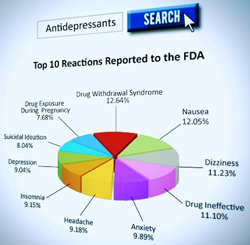Mental Health Watchdog Cites Need for Consumers to Search Psychiatric Drug Database for Documented Risks
By Kelly Patricia O’Meara
September 5, 2014
A recent JAMA Psychiatry study revealed that between 2009 and 2011, there were an estimated 267,000 emergency room visits because of adverse drug events from psychiatric drugs such as overdose, excessive sleepiness and head injuries. Over 19% of these emergency room visits resulted in patient hospitalization. The lead author of the JAMA study suggested the need for caution, increased surveillance, and reduced use of psychiatric drugs, and even encouraged alternative treatments.
The JAMA report, first released in July, breaks down the adverse drug events by class of drug, reporting that nearly 78,000 of the emergency room visits were due just to sedatives/anxiolytics, antidepressants and antipsychotics. Other drugs causing such reactions included lithium salts and stimulants.
This data should be of no surprise given the ever-increasing use of psychiatric drugs. According to IMS Health’s Total Patient Tracker database, psychiatric drug use now includes even the youngest of the nation’s population.
In fact, in 2013, more than one million American children between the ages of 0 and 5 were prescribed psychiatric drugs. For all ages, more than ten million Americans took ADHD drugs, 41 million took antidepressants, more than six and a half million took antipsychotics and 36 million took anti-anxiety drugs.
Seventy-nine million Americans, one-in-four, are currently prescribed psychiatric drugs. In an effort to provide accurate information about the documented risks associated with psychiatric drugs, the Citizens Commission on Human Rights (CCHR), the leading mental health watchdog, last year launched a comprehensive website and enhanced psychiatric drug database.
 This database could not have been more timely or user friendly. According to the Food and Drug Administration (FDA), between 2004 and 2012, there were more than five hundred thousand adverse reactions from psychiatric drugs reported to the federal agency. These reports are just the tip of the iceberg, as the FDA admits that only about 1% of serious adverse events are actually reported.
This database could not have been more timely or user friendly. According to the Food and Drug Administration (FDA), between 2004 and 2012, there were more than five hundred thousand adverse reactions from psychiatric drugs reported to the federal agency. These reports are just the tip of the iceberg, as the FDA admits that only about 1% of serious adverse events are actually reported.
More telling, however, is that most Americans are unaware of the national and international regulatory agency warnings on most psychiatric drugs. For example, there are 134 drug regulatory warnings associated with antidepressants, 44 regulatory warnings for ADHD drugs and 25 regulatory warnings for anti-anxiety drugs.
CCHR’s website and drug database provides a wealth of information for families, including adverse side effects, the number of studies showing adverse effects of specific drugs and the FDA’s data on adverse drug events. In short, the mental health watchdog has taken very complex data from a number of sources and provided an easy, user-friendly, format not available from the FDA or any other regulatory agency.
While many of the psychiatric drugs long have been branded with the Food and Drug Administration’s “Black box” warning—the federal agency’s most serious warning—too often the adverse reactions associated with psychiatric drugs are down played and physician follow-up is spotty, leaving those taking psychiatric drugs to find accurate information on their own.
The JAMA study reinforces the need for full disclosure and, with 79 million Americans taking at least one psychiatric drug, the study’s limited data at least provides an honest appraisal of the growing problem of adverse events associated with psychiatric drugs.
For those concerned about the dangers associated with psychiatric drugs, the following links provide a complete list of all documented side effects of the following categories of psychiatric drugs.
ADHD Drug Side Effects
Antidepressant Drug Side Effects
Antipsychotic Drug Side Effects
Anti-anxiety Drug Side Effects
—
Kelly Patricia O’Meara is an award-winning former investigative reporter for the Washington Times’ Insight Magazine, penning dozens of articles exposing the fraud of psychiatric diagnosis and the dangers of the psychiatric drugs—including her ground-breaking 1999 cover story, “Guns & Doses,” exposing the link between psychiatric drugs and acts of senseless violence. She is also the author of the highly acclaimed book, Psyched Out: How Psychiatry Sells Mental Illness and Pushes Pills that Kill. Prior to working as an investigative journalist, O’Meara spent sixteen years on Capitol Hill as a congressional staffer to four Members of Congress. She holds a B.S. in Political Science from the University of Maryland.




SHARE YOUR STORY/COMMENT